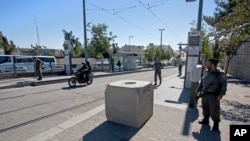Israel is tightening security in Jerusalem and the West Bank following a series of deadly incidents in which Palestinians rammed cars into Israelis.
On Wednesday, a Palestinian man plowed through a Jerusalem light rail platform, killing one person and wounding nine others.
Hours later, a Palestinian motorist wounded three Israeli soldiers when he rammed into them on a road between Hebron and Bethlehem.
A similar incident last month killed two people, including a three-month-old child, at a train stop in east Jerusalem.
The attacks have unnerved Israeli citizens and pose a challenge for security forces, who have ramped up their presence in response.
Israeli police spokesman Micky Rosenfeld told VOA on Thursday more than a thousand extra officers have been deployed in and around Jerusalem.
"And also yesterday evening in joint coordination with the municipality, we set up concrete blocks at the majority of the entrances to the light rail stops in order to prevent vehicles from pounding into innocent civilians on the sidewalk," Rosenfeld said.
Difficult to stop
Rosenfeld said expanded intelligence efforts also will aim to stop those threatening or planning attacks. But he acknowledged it will be difficult to stop "lone Hamas terrorists," referring to the Palestinian militant group.
Others are also questioning whether expanded security measures alone can stop the attacks, which fit within a larger pattern of unrest in east Jerusalem.
"What are you going to do? Outlaw all cars in East Jerusalem? It doesn't make any sense," said Samer Badawi, a Palestinian-American writer and Middle East analyst. "I think the response of the security forces within Israel is to go back to policies that have already failed."
Badawi is among those who say Palestinian violence will likely continue as long as Israel continues its decades-long occupation of the West Bank and continues expanding settlements there.
Another issue fueling Palestinian anger is the effort by some in Israel to expand Jewish access to the Temple Mount, which is known to Arabs as the Noble Sanctuary.
Israeli Prime Minister Benjamin Netanyahu on Thursday vowed there would be no change in the status quo at the flashpoint Jerusalem holy site, which has seen repeated clashes in recent weeks.
East Jerusalem, where the holy site is located, along with the West Bank and Gaza, are the areas where many Palestinians want to form their own independent state.




